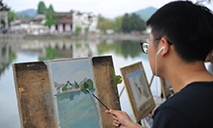Feature: With love and devotion, volunteers across U.S. bring Chinese language, culture closer to Americans
SAN DIEGO, the United States, Dec. 14 (Xinhua) -- Shiyin Yao is a research biologist from San Diego whose work involves developing flu adjuvants -- substances for vaccines that help enhance the body's immune response to an antigen.
But science is not her only love and devotion. After volunteering to teach at a local Chinese language school as her own children were studying there and more teachers were needed, Yao realized that she quite enjoys working with kids.
"Many kids, Americans or Chinese Americans, have no exposure to Chinese, and don't know how to speak it, read it or write it," she explained to Xinhua. "So we start simply: speaking first. Then we introduce them to Pinyin. Then we can move on to teach the stroke sequences for more complex characters."
Across the United States, more public-spirited volunteers like Yao are doing their part in local schools and communities to help share the best of the Chinese language and culture with their American neighbors. And many of them came to San Diego on Saturday to tell their volunteering stories during a meeting held on the sidelines of the 13th National Convention and Chinese Education Conference.
The conference, which run from Friday to Sunday, was organized by the Chinese School Association in the United States, a non-profit organization established in 1994. More than 200 representatives of Chinese language schools nationwide took part in the event.
Yu Ye, a public school teacher at Arizona's Mandarin Immersion Program, also attended Saturday's meeting. Acting as a volunteer every Saturday at the Contemporary Chinese Language School in Phoenix, capital city of Arizona, Ye said she has developed very different strategies to teach the Chinese language to American and Chinese American kids.
"Teaching is a passion of mine, and what I learn by teaching these two different types of students helps me to contribute better to their education and to the whole community," she said proudly.
At the meeting, Xiao Dong, principal of the Talent School of the St. Louis Modern Chinese School (SLMCS) in Missouri, said traditional Chinese artforms, like calligraphy, singing, dancing and mask-making, are all taught to the local communities.
"As the first-generation Chinese American immigrants, we carry our culture with us to share with our American neighbors," he said.
The world will be more globalized in the post-pandemic era, and "we want to help that global melting pot happen faster," he said. "We start sharing our culture by sharing our food," he smiled. "Everyone loves Chinese food!"
The SLMCS hosts a two-day Chinese food and culture fair each summer, which attracts over 8,000 local participants annually, and a Chinese New Year celebration each winter.
Shu Zhang, a parent staff volunteer at the SLMCS, told Xinhua she has volunteered from her heart. "I wanted to be a good example to my own children, a boy, 16, and a girl, 12, not to just tell them that getting involved in the community was important, but to lead by example."
In Georgia, public schools have been adding Chinese language classes to their official curriculum at a phenomenal rate -- from just four schools in 2000 to more than 100 in 2012.
Li Wang, owner and principal of the largest Chinese language school in Columbus, Georgia, told Xinhua she has witnessed the positive effect Chinese classes are creating on student behaviors.
"We have white students, black students, Indian students, and Chinese and Korean students in our classes. Learning Mandarin together helps them to get along and play well together. And their parents know it will benefit them and their careers in the future," she said.
Yueming Cheng, a retired automotive engineer from San Francisco, has been volunteering in a local Chinese language school, because she felt the classes are a very important way for immigrants to remember their culture.
"When they come to the U.S., they get very involved in American culture, but they don't want to lose the unique things that Chinese culture has to share," she said.
"People need to know about both cultures, so they can help improve U.S.-China relations," she added.
Photos
Related Stories
- China to take necessary measures if U.S. bans imports from Xinjiang: MOC
- China, U.S. should adopt "live and let live" approach in governance, says scholar
- Tough U.S. policies against China in trade, immigration have backfired: Forbes
- U.S. "democracy summit" anything but democratic: Chinese diplomat
- U.S.-listed Chinese firms trade mostly lower
Copyright © 2021 People's Daily Online. All Rights Reserved.










